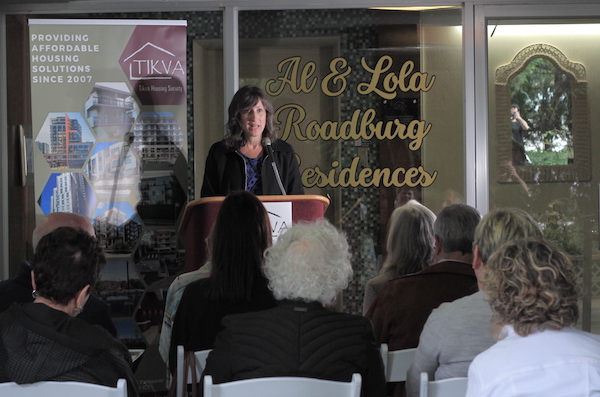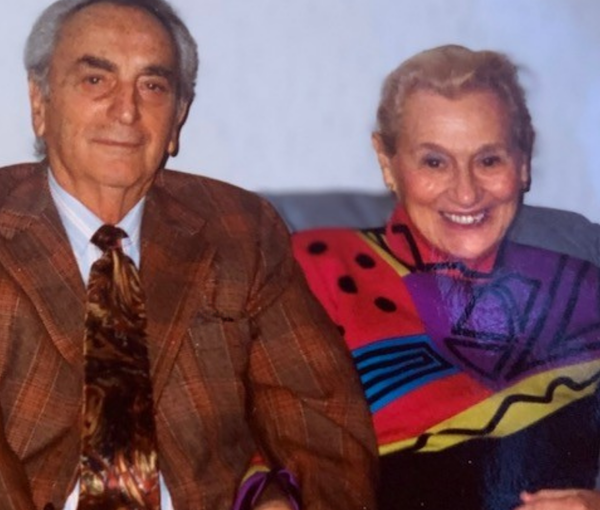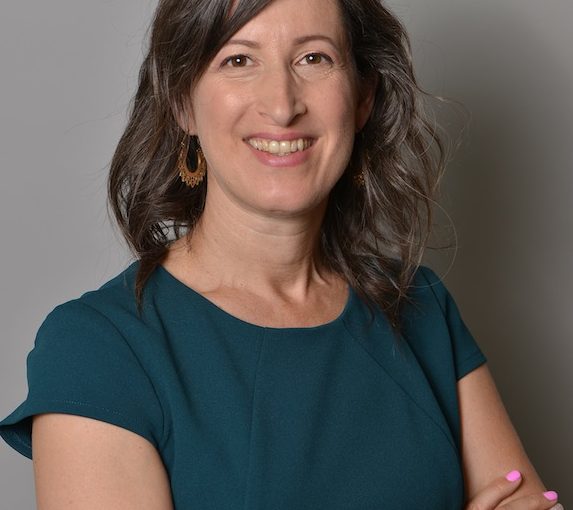Tikva Housing Society executive director Anat Gogo speaks at the May 24 opening of the Al and Lola Roadburg Residences. (photo filmoit.com courtesy Tikva Housing)
When the Kerrisdale building she has been living in for 24 years went up for sale last year, worried she would be cast out, like so many Vancouverites who have been “renovicted.”
She and other residents of the characteristic midcentury building on West 41st Avenue, many of whom had done no more than nod to one another in the hallways, anxiously discussed their fate, knowing that it was largely out of their hands. The tenants had experienced minimal rent increases over decades, as the elderly family owners provided minimal renovations, and the tenants enjoyed exceptionally low rents for the location.
Anxiety turned to jubilation when they learned that the building had been purchased by a nonprofit – Tikva Housing Society, the Jewish community’s agency for affordable housing.
Speaking May 24 at the official opening of the Al and Lola Roadburg Residences – Tikva’s new name for the building until then known as the Bonnie El – Bernstein said her worries for the future had begun to wear on her well-being.
“I decided to surrender, as the ruminating was truly disturbing my life,” she told the crowd. “All that was left was prayer. I asked many friends and family to pray for the best possible outcome. Lo and behold, we were given the incredible news that Bonnie El had been bought by a nonprofit organization, Tikva Housing Society. The only conclusion I can come up with is that God answers prayers.”
Throughout her life, from her early years in South Africa to her migration to Vancouver and a new beginning at Bonnie El as a single mother, Bernstein said, “I have experienced such incredible compassion, generosity and empathy from throughout the Jewish community no matter where in the world I have been. I am honoured to be part of that community and to witness firsthand what so many do day after day to help make the city a better place.”
All existing residents of the building will be grandfathered, but Tikva officials were surprised and pleased to discover that, by pure coincidence, about a quarter of the existing residents are Jewish.
And that’s not the only Jewish connection. In doing their due diligence on the building, they discovered that it was built in 1961 by the Golden and Averbach families. It didn’t take long to sleuth out more information. Local businessman and philanthropist Gary Averbach explained that Bonnie El was named after his sister, Bonnie, and her husband, Elliott Leyton.
The new Roadburg Residences, made possible by a grant from the Al Roadburg Foundation, includes four studio apartments, 13 one-bedrooms, two two-bedrooms and one three-bedroom suite. The acquisition and renovation of the building brings to 148 the number of units owned and operated by Tikva, with a further 20 opening in Burnaby this summer. Tikva also provides rent subsidies to people living in market housing or facing housing challenges, according to Anat Gogo, Tikva’s executive director. In all, 300 people, including 120 children, benefit from Tikva’s housing solutions. There remain 302 applicants on the community’s Jewish Housing Registry.
“In our mission to provide access to affordable housing solutions, we dream big,” Gogo told the audience in the spacious covered alcove outside the building’s front door. “Our staff and board are committed to tackling housing insecurity, but we can’t do it alone.”
Gogo credited support from across the community, citing, in addition to the Al Roadburg Foundation, the Jewish Federation of Greater Vancouver, Jewish Family Services and others for bringing the project to fruition.
“Rather than demolishing and building new, Tikva is preserving this 20-unit building that still has many years remaining,” she said, to applause and whoops of approval from assembled residents.
Robert Matas, director of the Al Roadburg Foundation, spoke of his longtime association with the late philanthropist and the Roadburg family’s commitment to causes in Vancouver and Israel. He acknowledged family members in the audience, including Al and Lola Roadburg’s daughter, Lorraine, and Matas’s wife, Alicia, who is a niece of Al and Lola Roadburg.
Rhonda Sacks, board chair of Tikva, thanked the staff of the organization and celebrated the exponential growth of the society and its housing units – up more than five-fold from 28 units in the last several years.
Ezra Shanken, chief executive officer of the Jewish Federation of Greater Vancouver, spoke of his family’s experience with renovictions in the city, having twice been forced from homes before purchasing their own.
Tikva board members cut the ceremonial ribbon and Rabbi Carey Brown, associate rabbi at Temple Sholom, said the blessing and affixed the mezuzah to the front doorpost of the building.






